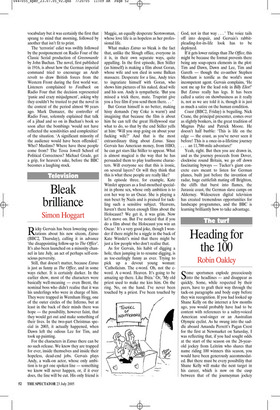Bleak brilliance
Simon Hoggart
Ricky Gervais has been lowering expectations about his new sitcom, Extras (BBC2, Thursday), calling it in advance ‘the disappointing follow-up to The Office’. It’s also been launched on a minority channel in late July, an act of perhaps self-conscious perversity.
Still, that doesn’t matter, because Extras is just as funny as The Office, and in some ways richer. It is certainly darker. In the earlier show, most of the characters were basically well-meaning — even Brent, the nominal boss who didn’t realise that it was his underlings who were in charge of him. They were trapped in Wernham Hogg, one of the outer circles of the Inferno, but at least in the back of their minds there was hope — the possibility, however faint, that they would get out and make something of their lives. In the two-part Christmas special in 2003, it actually happened, when Dawn left the odious Lee for Tim, and took up painting.
For the characters in Extras there can be no such release. We know they are trapped for ever, inside themselves and inside their hopeless, dead-end jobs. Gervais plays Andy, a walk-on actor, whose only ambition is to get one spoken line — something we know will never happen, or, if it ever does, the line will be cut. His only friend is Maggie, an equally desperate Scotswoman, whose love life is as hopeless as her professional life.
What makes Extras so bleak is the fact that, unlike the Slough office, everyone in it is, in their own separate ways, quite appalling. In the first episode, Ben Stiller (as himself) is making a film about Goran, whose wife and son died in some Balkan massacre. Desperate for a line, Andy tries to ingratiate himself with Goran, who shows him pictures of his naked, dead wife and his son. Andy is sympathetic. ‘But you missed a trick there, mate. Truprint give you a free film if you send them there... ’ But Goran himself is no better, making hissy demands (‘my Coke is warm’) and imagining that because the film is about him he can tell the great Hollywood star what to do, so that by the end Stiller yells at him: ‘Will you stop going on about your fucking wife?’ And that is the most extraordinary thing about Extras. Since Gervais has American money, from HBO, he can get stars like Stiller to appear. What is almost magical is the way that he has persuaded them to play loathsome characters. Will everyone see that this is ironic, on several layers? Or will they think that this is what these people are really like?
In episode three, for example, Kate Winslet appears as a foul-mouthed specialist in phone sex, whose only ambition is to con her way to an Oscar. She is playing a nun beset by Nazis and is praised for tackling such a sensitive subject. ‘Heavens, haven’t there been enough films about the Holocaust? We get it, it was grim. Now let’s move on. But I’ve noticed that if you do a film about the Holocaust you win an Oscar.’ It’s a very good joke, though I wonder if there might be a niggle in the back of Kate Winslet’s mind that there might be just a few people who don’t realise that.
As for Gervais, his habit of digging a hole, then jumping in to resume digging, is as toe-curlingly funny as ever. Trying to pick up a devout young woman: ‘Catholicism. The c-word. Oh, not the cword. A c-word. Heaven. It’s going to be amazing up there. Like Ibiza.’ Or, ‘My old priest used to make me kiss him. On the ring. No, on the hand. I’ve never been touched by a priest. I’ve been touched by God, not in that way ... ’ The voice tails off into despair, and Gervais’s rabbitpleading-for-its-life look has to be deployed.
If it gets lower ratings than The Office, this might be because the format prevents there being any soap-opera elements in the plot: Tim and Dawn, Dawn and Lee, Tim and Gareth — though the co-author Stephen Merchant is terrific as the world’s most incompetent agent. Gervais complains, ‘He sent me up for the lead role in Billy Eliot!’ But Extras really has legs. It has been called a satire on showbusiness as it really is, not as we are told it is, though it is just as much a satire on the human condition.
Coast (BBC2, Friday) is beguiling. Nick Crane, the principal presenter, comes over as slightly bonkers, in the great tradition of Magnus Pyke and Patrick Moore. He doesn’t half burble: ‘This is life on the edge — the coast, as you’ve never seen it before! This is a once-in-a-lifetime journey ... an 11,700-mile adventure!’ Yeah, right. But then you are drawn in, and as the journey proceeds from Dover, clockwise round Britain, we go off down fascinating byways — Tucker’s giant concrete ears meant to listen for German planes, built just before the invention of radar, huge cuttlefish mating off Brighton, the cliffs that burst into flames, the Jurassic coast, the German slave camps on Alderney. Widescreen digital television has created tremendous opportunities for landscape programmes, and the BBC is learning brilliantly how to take advantage.















































 Previous page
Previous page